Key takeaways
- The Portland Writers Community fosters a supportive and inclusive environment, encouraging growth through honest feedback and collaboration.
- Chet Weise emphasizes authenticity, simplicity, and the power of silence in storytelling, impacting how writers connect with their readers.
- Engaging actively in critiques enhances one’s own writing skills, demonstrating the value of community participation.
- Personal experiences with vulnerability and openness lead to more powerful and relatable storytelling.
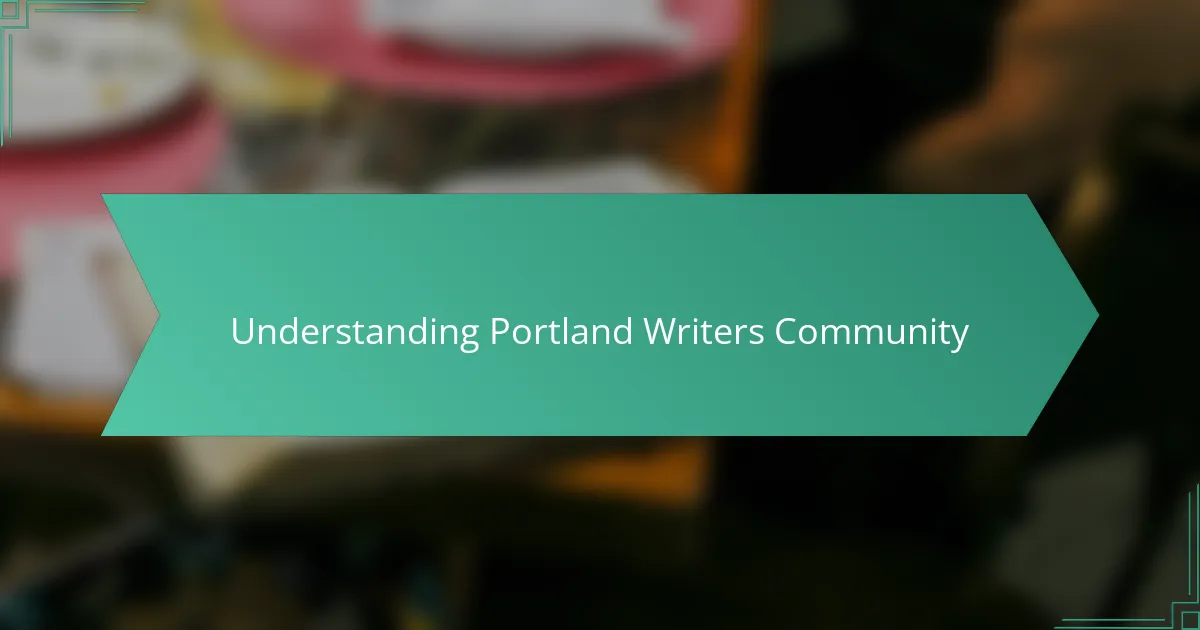
Understanding Portland Writers Community
Portland Writers Community is more than just a group of people who write; it’s a vibrant network bound by a shared passion for storytelling. When I first joined, I was surprised by how open and supportive everyone was—it felt like stepping into a room where every voice mattered. Have you ever wondered what it’s like to be surrounded by people who genuinely want you to succeed as a writer? That’s exactly the energy here.
The community thrives on collaboration and honest feedback, which can be both exhilarating and humbling. I remember bringing a rough draft to a session, expecting polite nods, but instead, I received thoughtful critiques that pushed me to dig deeper. It made me realize that growth as a writer is often sparked by honest conversations rather than praise alone.
What strikes me most about Portland Writers Community is its inclusivity—everyone’s stories, no matter the style or genre, find a place to be heard. There’s something powerful in knowing that your unique voice enriches this collective tapestry, creating a space where creativity truly flourishes. Have you experienced that sense of belonging in a creative community before? Here, it feels like home.
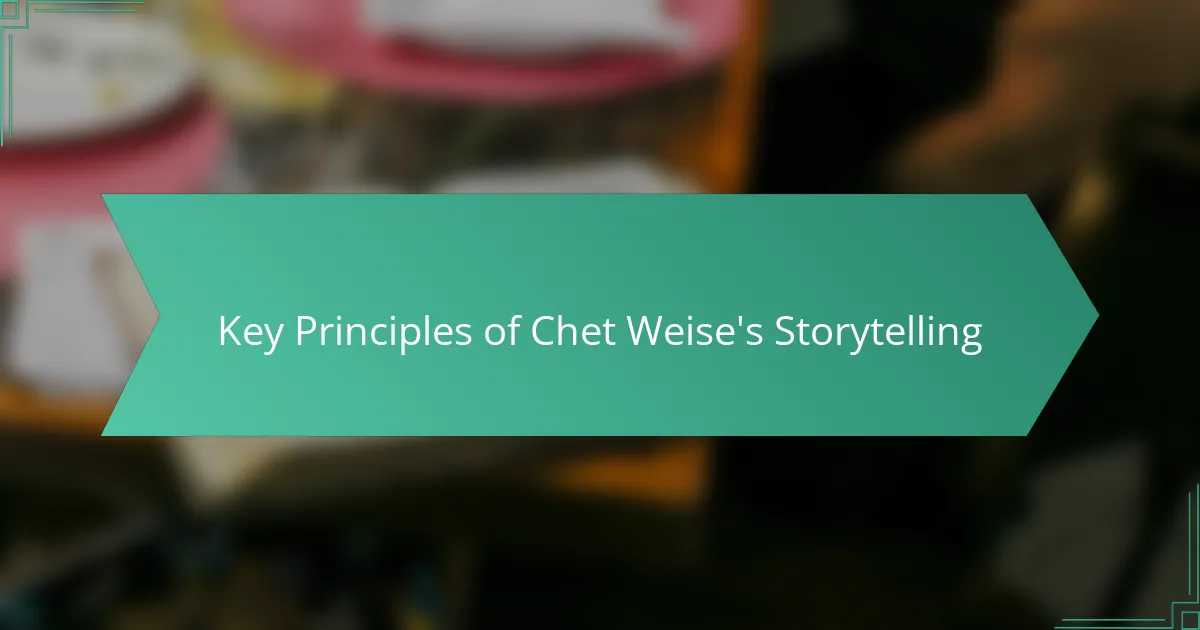
Key Principles of Chet Weise’s Storytelling
Chet Weise’s storytelling hinges on authenticity—he taught me that the heart of a story isn’t just the plot, but the genuine emotions that breathe life into it. Have you ever noticed how his characters feel so real, almost as if they could step off the page? That’s because he lets his own experiences and vulnerabilities shape them, making every tale deeply personal and relatable.
Another principle I’ve taken to heart is his mastery of simplicity. Chet doesn’t rely on flashy language or complex structures; instead, he focuses on clear, straightforward writing that carries immense emotional weight. It made me rethink my tendency to overcomplicate, reminding me that sometimes less truly is more when it comes to connecting with readers.
What stands out most is Chet’s belief in the power of silence and pauses within storytelling. I once tried to rush through my narrative, fearing I’d lose attention, but seeing how he uses quiet moments to build tension taught me to trust the reader’s imagination. Isn’t it fascinating how what’s left unsaid can sometimes speak the loudest?
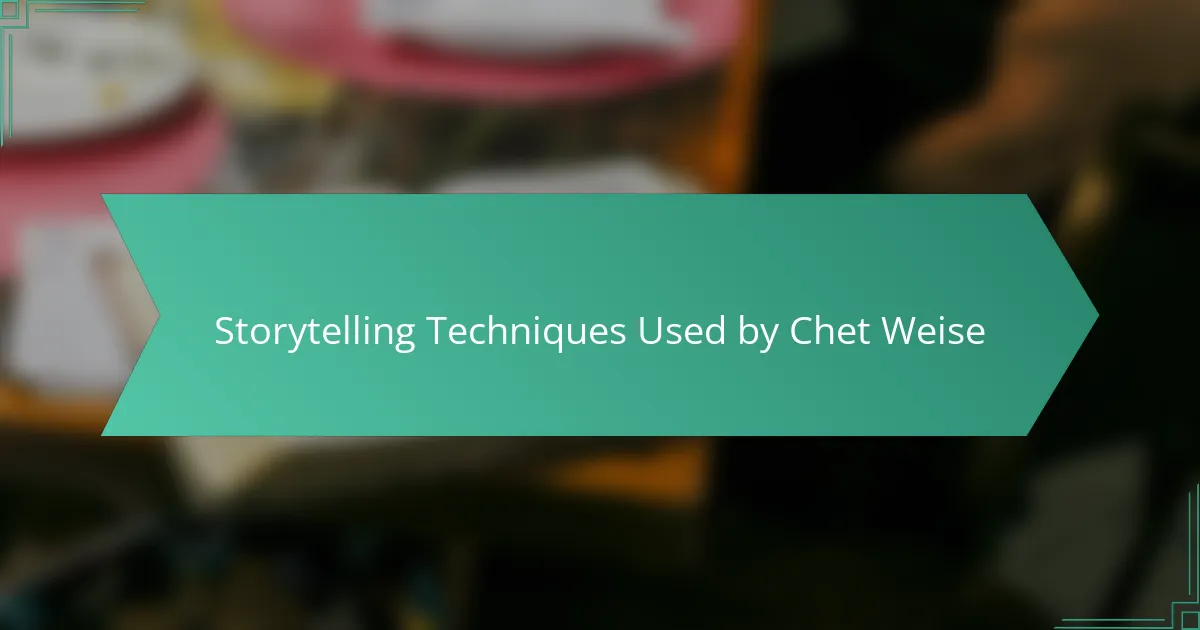
Storytelling Techniques Used by Chet Weise
One of the storytelling techniques Chet Weise uses that really struck me is his skillful use of vivid imagery. When I first read his work, I found myself transported into the scene, noticing details I hadn’t expected to catch. Have you ever read something that painted such a clear picture it felt like you were right there? That’s the power of his descriptive style—he invites you in without overwhelming you.
Another technique I admire is how Chet structures his narratives with a natural flow. He doesn’t force moments; instead, he lets the story unfold as if it’s a conversation. I once tried mimicking this in my own writing and was surprised by how much more engaging it felt, both to write and to read. Could it be that storytelling becomes more genuine when it moves like everyday speech?
Finally, Chet’s use of character-driven conflict always keeps me hooked. His stories are less about external drama and more about internal struggles that reveal deeper truths. I remember thinking, “Wow, these characters feel flawed and human,” which made me reflect on how I approach my own characters. Isn’t it these imperfections that make stories resonate on a personal level?
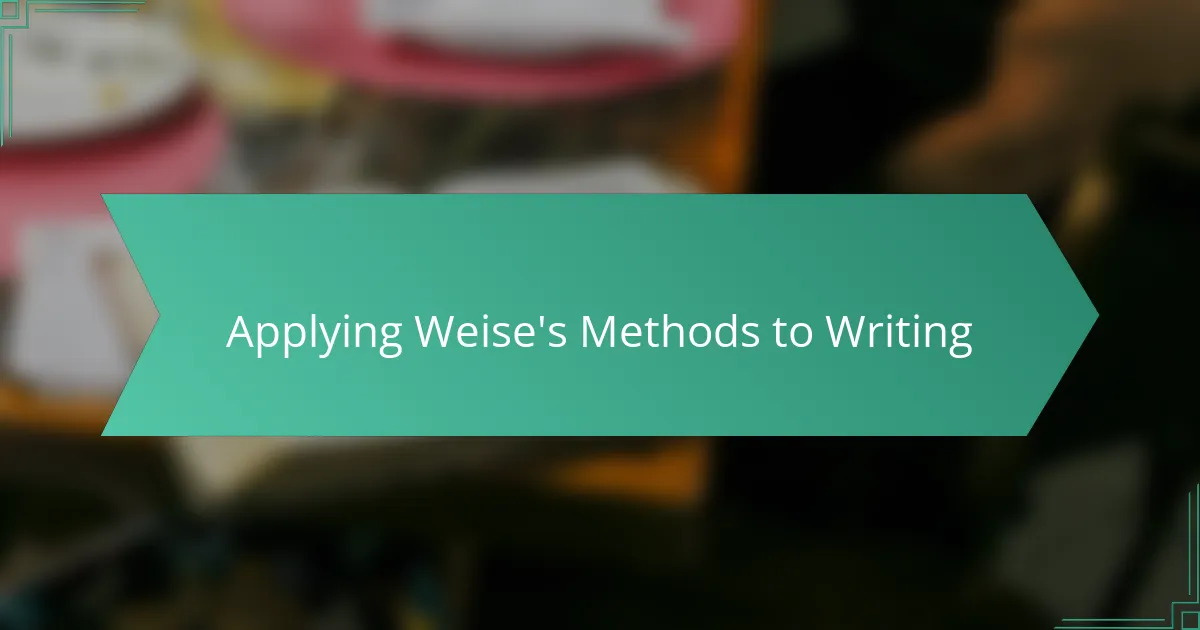
Applying Weise’s Methods to Writing
Applying Weise’s methods to my writing felt like unlocking a new dimension of honesty. I started letting my own vulnerabilities seep into my characters, which was both scary and freeing. Have you ever wondered what happens when you stop hiding behind polished prose and just tell the truth? For me, it created a connection I hadn’t experienced before.
I also began embracing simplicity in a way I never had. Instead of piling on fancy words, I focused on choosing the right ones that carried emotional weight—just like Weise does. It was surprising to see how much more powerful my stories became simply by stripping away the extra layers I once thought were necessary.
One of the biggest shifts came when I learned to trust silence in my storytelling. I used to rush through scenes, afraid readers would lose interest, but pausing allowed the tension to build naturally. Have you noticed how the spaces between words can sometimes say more than the words themselves? Applying this taught me patience and respect for the reader’s imagination.

Personal Experience with Chet Weise’s Teachings
Working through Chet Weise’s teachings really felt like a personal journey for me. I remember the first time I tried to write with that raw honesty he advocates—it was nerve-wracking to expose so much of myself on the page. But strangely, it also felt liberating, as if I was finally speaking my true voice rather than a filtered version of it.
One moment that sticks with me is when I shared a piece informed by his emphasis on simplicity during a community workshop. The feedback surprised me—it resonated deeply with others, proving that clarity and emotional truth can connect more than elaborate vocabulary ever did. Have you ever experienced that kind of unexpected connection through something simple?
What made the biggest difference, though, was learning to embrace silence in my writing. Early on, I used to rush through scenes, fearing they’d drag or bore readers. Watching Chet’s work taught me patience—allowing pauses to breathe life into moments and trusting the reader to fill in the gaps. That shift changed how I think about pacing and tension entirely.
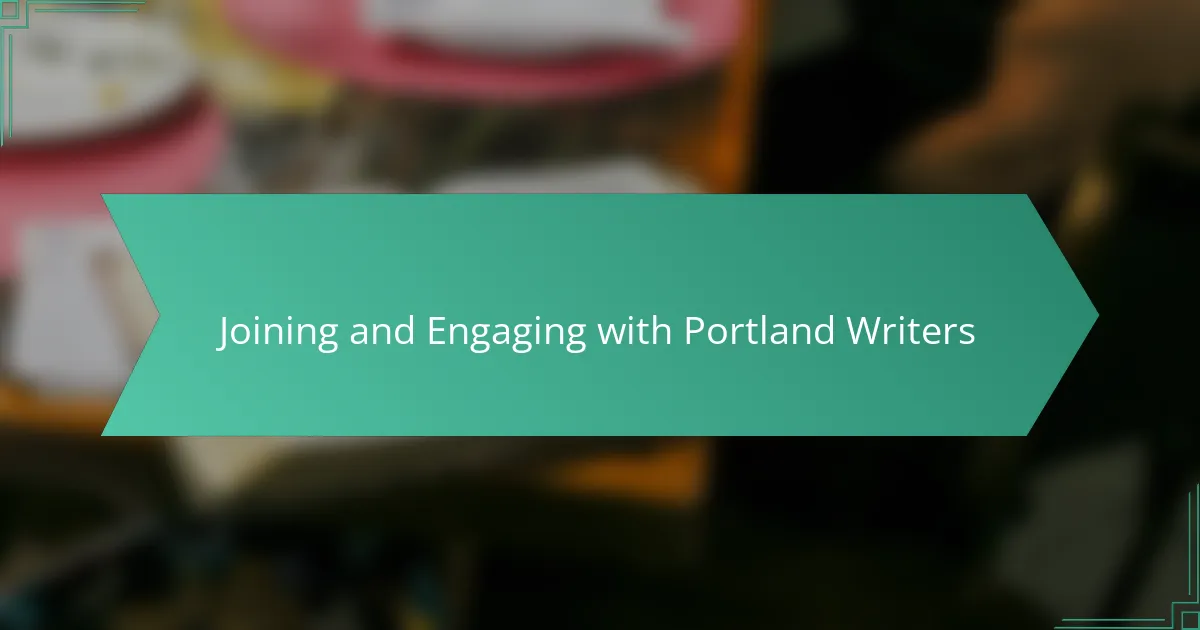
Joining and Engaging with Portland Writers
When I first decided to join the Portland Writers Community, I wasn’t sure how to dive in. But showing up to a local workshop and simply sharing a small piece of my writing opened the door to honest conversations and unexpected friendships. Have you ever felt that mix of nervous excitement when stepping into a new group? That’s exactly what happened to me, and it was worth every bit of the risk.
Engaging with the community goes beyond just attending events; it’s about participating actively in critiques and group discussions. I found that offering thoughtful feedback not only helped others but also sharpened my own writing senses. Do you think giving feedback could actually improve your work? From my experience, it absolutely does—it’s like learning twice over, once by listening and once by reflecting.
What really surprised me was how approachable everyone is, from seasoned authors to beginners. Whether it was a casual coffee meetup or an intense editing session, I always felt encouraged to bring my full, imperfect self. Isn’t that the kind of support every writer dreams of? Portland Writers makes that dream feel real—and it’s this shared commitment that fuels my growth as a storyteller.